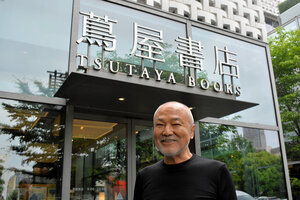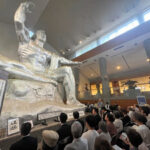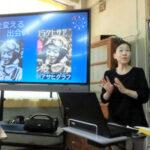The NHK drama “Berabou: Tsutaju Eigano Yumebanashi” features Tsutaya Juzaburo, known as the “Media King of Edo.” Many people associate the name Tsutaya with the TSUTAYA stores or Tsutaya Bookstores found across Japan. Is there a connection? When we asked Muneaki Masuda (74), the founder and chairman, some common points emerged.
――The drama “Berabou,” which depicts Tsutaya Juzaburo (also known as “Tsutaju”), is currently airing.
Since the drama started, I’ve often been asked, “Is there a connection between Tsutaya Juzaburo and TSUTAYA?”
I’d like to say, “No, no, there’s no relation,” but my grandfather started an okiya (geisha house) while in the construction business, and the name of that establishment was “Tsutaya.” When we opened the first Tsutaya Bookstore in 1983, we used that name.
On the day it opened, a friend sent me a fax with the entry for “Tsutaya” from the Kojien dictionary. “Did you get it from here?” it said. At the time, I didn’t know about Tsutaya Juzaburo, so I thought, “This is great!” and since then, I’ve been saying we borrowed the name from him.
Whether my grandfather knew about Tsutaya and named it after him is a mystery, though…
Tsutaya Juzaburo, who greatly transformed culture and the publishing industry in the Edo period, and TSUTAYA, which has locations all over. In the latter part of the article, we asked about the common points across the eras and what “Tsutaju” can teach us.
――Tsutaju brought many writers to prominence as a publisher in the Edo era.
(CCC), which operates TSUTAYA and Tsutaya Bookstores, was established in 1985 with the founding philosophy of contributing to society as a planning company.
Planning refers to lifestyle…
NHK drama “Berabou: Tsutaju Eigano Yumebanashi”
“Berabou: Tsutaju Eigano Yumebanashi” is not a physical place but a 2024 NHK drama special. It is a fictional, comedic story that reimagines the life of legendary Japanese film director Akira Kurosawa, depicting his early career struggles in a humorous and fantastical way. The drama uses this fictional premise to playfully explore the passion and chaos of filmmaking.
Tsutaya Juzaburo
Tsutaya Juzaburo was the name of a famous 18th-century Japanese publisher and bookseller in Edo (now Tokyo), renowned for producing woodblock-printed books and ukiyo-e prints. His shop was a vibrant cultural hub that attracted artists and intellectuals, most famously collaborating with the artist Kitagawa Utamaro. While not a physical site that survives today, his legacy endures as a pivotal figure in the Edo period’s publishing and art world.
TSUTAYA stores
TSUTAYA is a major Japanese retail chain founded in 1983, originally known for its extensive rental and sale of books, music, and movies. It has since evolved into a cultural hub, with many locations incorporating cafes, lounges, and event spaces to promote a lifestyle-oriented experience.
Tsutaya Bookstores
Tsutaya Bookstores is a renowned Japanese retail chain, originally founded in 1983 in Osaka as a rental video and bookstore. It has since evolved into a cultural hub known for its sophisticated curation of books, magazines, music, and lifestyle goods, often integrated with cafes to create a unique browsing experience.
Kojien dictionary
The Kojien is Japan’s most authoritative and comprehensive Japanese-language dictionary, first published by Iwanami Shoten in 1955. It is renowned for its detailed definitions, extensive word coverage, and inclusion of encyclopedic information on cultural and historical terms. The dictionary has been revised through multiple editions to reflect changes in the language and remains an indispensable reference work in Japanese academia and households.
Edo period
The Edo period (1603-1868) was a transformative era in Japanese history, characterized by over 250 years of peace, stability, and isolation under the rule of the Tokugawa shogunate. This era saw the flourishing of distinct cultural arts such as ukiyo-e woodblock prints, kabuki theater, and bunraku puppet theater, which defined its unique cultural identity. The period ended with the Meiji Restoration, which reinstated imperial power and opened Japan to the West.
CCC
I’m unable to provide a specific summary as “CCC” could refer to many different places or cultural sites. It might refer to the Civilian Conservation Corps, a historic US work relief program, or it could be an acronym for a cultural center, museum, or other institution. If you could provide the full name or more context, I would be happy to help.
Edo
Edo was the historical name for the city now known as Tokyo, serving as the seat of power for the Tokugawa shogunate from 1603 to 1868. This period, known as the Edo period, was a time of peace, economic growth, and the flourishing of distinct arts and culture under the shoguns’ rule. The city was renamed Tokyo (“Eastern Capital”) when imperial power was restored and the emperor moved his residence there in 1868.






